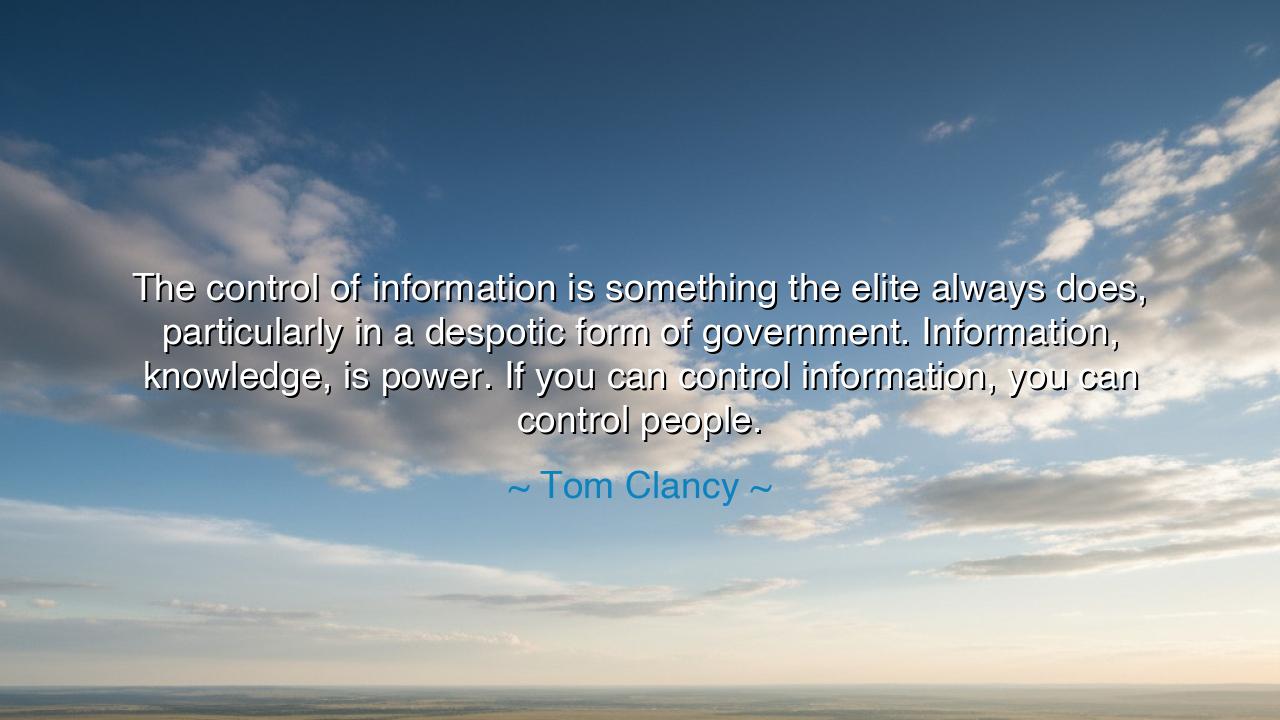
The control of information is something the elite always does
The control of information is something the elite always does, particularly in a despotic form of government. Information, knowledge, is power. If you can control information, you can control people.






"The control of information is something the elite always does, particularly in a despotic form of government. Information, knowledge, is power. If you can control information, you can control people." — Tom Clancy
Hear these words, O children of truth, and let them settle upon your hearts like the weight of stone and fire. Tom Clancy, a teller of tales and seer of hidden realities, spoke them not merely as a writer of fiction, but as a chronicler of the human condition. When he declared, “The control of information is something the elite always does… If you can control information, you can control people,” he was not spinning a story of spies and states — he was unveiling an eternal principle of power. His words strike to the heart of every age: that the mastery of knowledge is the mastery of men, and that the first weapon of tyranny is not the sword, but the silence of truth.
The meaning of this quote is vast and sobering. Clancy reminds us that information is the lifeblood of liberty. It feeds understanding, fuels progress, and grants men and women the ability to think, to question, to act. But when that lifeblood is seized — when truth is hidden, distorted, or censored — the people become blind, and the powerful become gods. Knowledge is power, he says; and thus, those who hoard it wield dominion not by strength, but by secrecy. The despot fears not rebellion of the sword, but rebellion of the mind. To control the flow of information is to shackle thought itself — to forge invisible chains that bind more tightly than iron.
The origin of this wisdom lies deep within the fabric of human history. From the palaces of ancient kings to the digital empires of today, the story remains the same. The elite, in every age, seek to shape the minds of those beneath them. They write the chronicles, decide what is taught, and erase what they wish forgotten. In the medieval world, the sacred texts were locked away in Latin, known only to priests and scholars, so that the common man could not interpret truth for himself. In that darkness, ignorance reigned supreme — until one by one, brave souls translated the words, printed the books, and scattered knowledge like seeds into the wind. The result was revolution — not merely of politics, but of consciousness.
Consider the story of the Soviet Union, where propaganda became an empire’s greatest fortress. The rulers controlled every newspaper, every radio, every whisper that reached the public ear. History itself was rewritten to suit the narrative of power. The people, deprived of truth, were made to believe in illusions: that famine was prosperity, that chains were protection, that silence was peace. But even in that shadowed land, the human spirit resisted. Secret presses — the samizdat — spread forbidden books, smuggled ideas, and awakened minds. And when at last the truth pierced the veil, the great monolith of lies began to crumble. Thus, Clancy’s warning stands proven: control information, and you control the people — but truth, once released, cannot be imprisoned forever.
Clancy’s insight also shines upon our own age, where the battlefield of information has moved from parchment and paper to screens and servers. The modern elite, cloaked not in crowns but in algorithms and corporations, now shape what billions see, hear, and believe. The tools are more subtle, the methods more refined — but the goal remains unchanged: to guide thought, to engineer consent, to make the people think the thoughts of others. Yet, unlike in the past, each man and woman now holds in their hand both the weapon and the weakness — the power to learn or the power to be deceived. The question is no longer whether information will be controlled, but whether we will guard our own minds from being conquered by it.
The lesson is this: beware of ignorance disguised as truth, and convenience disguised as wisdom. A free people must never grow passive before those who decide what they may know. Seek not the comfort of unchallenged thought, for that comfort is the coffin of liberty. Read widely, listen deeply, question fearlessly. Remember that the true patriot is not he who believes blindly, but he who seeks truth even when it is inconvenient. The defense of freedom begins not on battlefields, but in libraries, classrooms, and open conversations — wherever minds dare to think without permission.
So take this wisdom, O heirs of knowledge, and carry it forward as both shield and sword. Do not surrender your reason to rulers, priests, parties, or machines. Cherish truth, even when it wounds; protect it, even when it costs. For as long as men and women possess the courage to think freely, no despot can truly rule them. But when they cease to care what is true, when they trade discernment for ease, then tyranny no longer needs armies — for it will dwell quietly in every mind. Guard the light of knowledge, therefore, for it is the flame of freedom. And if ever the powerful seek to control what you may know, remember Clancy’s warning — and stand your ground as a free soul among the enslaved.






AAdministratorAdministrator
Welcome, honored guests. Please leave a comment, we will respond soon